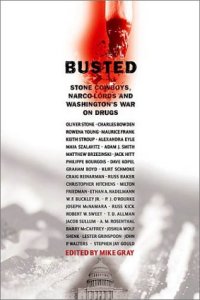 Book By China Syndrome Writer,
Paints a Vivid Portrait of Futility and Failure
Book By China Syndrome Writer,
Paints a Vivid Portrait of Futility and Failure
As politicians proclaim their support for an ever-escalating "War on Drugs," the first popularly written book exposing the futility of this losing war is being praised across the political spectrum. Drug Crazy: How We Got Into This Mess and How We Can Get Out, [Random House, 240 pages, $23.95; Publication date June 15, 1998] dramatically reveals the violence, corruption and chaos that characterize America's longest-running war. Author Mike Gray was a prominent journalist, screenwriter, author, producer and documentarian, whose best known work includes the film The China Syndrome, which he wrote, and the television series Star Trek: The Next Generation, for which he has served as a writer and producer. In an era when politicans vie to offer ever more draconian penalties to prove they are "tough on drugs" -- and when a marijuana conviction can result in a longer prison sentence than murder -- Gray dared to point out that our current policies are an abject failure, despite the world's highest incarceration rates and the expenditure of more than $300 billion in the last fifteen years alone. He eloquently argued for the return of a medical rather than a law enforcement model of drug control. Drug Crazy was praised in advance of publication from across the political spectrum: By two Nobel Prize winners (economist Milton Friedman and physicist Henry Kendall); by former Attorney General Elliott Richardson and former Surgeon General Joycelyn Elders; by liberal journalist Daniel Schorr and conservative journalist William F. Buckley; and by other prominent academics, scientists, public policy experts, criminologists and social commentators. While many political and sociological treatises have been written on drug policy and reform, Drug Crazy broke new ground by vividly and dramatically recreating eight decades of ongoing and escalating drug warfare, including:
Special thanks to the Common Sense for Drug Policy
|

